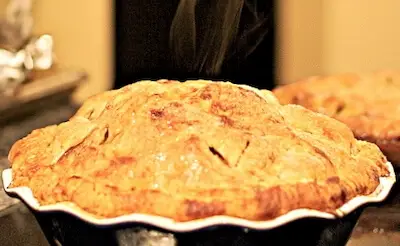Very hot, usually referring to food.
Piping hot
What's the meaning of the phrase 'Piping hot'?
What's the origin of the phrase 'Piping hot'?
In Scotland, ceremonial dishes of food are often brought to the table to the accompaniment of bagpipes, that is, they are ‘piped in’. This could easily be imagined to be the origin of ‘piping hot’. It isn’t though. Nor does the phrase derive from food being ‘piped aboard’ ships.
hot’ is a reference to the whistling
sound made by steam escaping
from a hot pie.
The derivation of this little phrase is the sizzling, whistling sound made by steam escaping from very hot food, which is similar to the sound of high-pitched musical pipes.
An early citation is given in Philemon Holland’s translation of Pliny’s Historie of the world, 1601:
“Beanes… fried all whole as they be, and so cast piping hot into sharp vineger.”
Chaucer had also used the phrase, in language less accessible to us, but much earlier. This is from The Miller’s Tale, circa 1390:
He sente hir pyment meeth and spiced ale
And wafres pipyng hoot out of the glede.[He sent her sweetened wine and well-spiced ale
And waffles piping hot out of the fire]
The history of “Piping hot” in printed materials
Trend of piping hot in printed material over time
Related phrases and meanings
Browse more Phrases
About the Author

Phrases & Meanings
A-Z
A B C D E F G H I J K L M N O P Q R S T UV W XYZ
Categories
American Animals Australian Bible Body Colour Conflict Death Devil Dogs Emotions Euphemism Family Fashion Food French Horses ‘Jack’ Luck Money Military Music Names Nature Nautical Numbers Politics Religion Shakespeare Stupidity Entertainment Weather Women Work
How did we do?
Have you spotted something that needs updated on this page? We review all feedback we receive to ensure that we provide the most accurate and up to date information on phrases.
